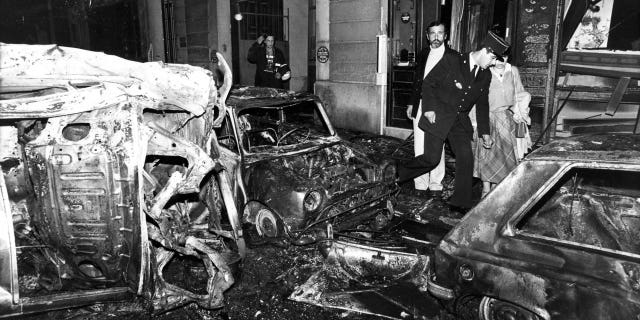Canadian professor convicted of 1980 Paris synagogue bombing
- Professor Hassan Diab of Ottawa, Canada, was convicted and sentenced in absentia for the 1980 Paris synagogue bombing that killed four people and injured 46.
- Diab carried out France’s first anti-Semitic terror attack since World War II and eluded investigators for decades.
- Jewish leaders in France are urging Canadian authorities to execute Diab’s arrest warrant, despite protests from activists, supporters and the professor himself.
A Paris court on Friday convicted a Lebanese-Canadian professor in absentia of terrorism charges and sentenced him to life in prison over the deadly 1980 Paris synagogue bombing, one of France’s biggest unsolved crimes for decades. was one of
The court issued an arrest warrant for the suspect, Hassan Diab, who lives and teaches in Ottawa, Canada, and denies wrongdoing. He was convicted of terroristic murder for an attack in which four people were killed and 46 were injured.
For the victims, the ruling means justice at last, more than four decades after the bombing was described as the first anti-Semitic terrorist attack in France since World War II.
France refuses to extradite far-left Italian terrorists who have been on the run from justice since the 1980s
But for Diab and his supporters, the decision is a setback and a judicial error. His lawyers say he was studying for university exams in Lebanon at the time of the attack and is a victim of mistaken identity, a scapegoat for a justice system determined to find a culprit.
French authorities accused Diab of planting a motorbike bomb outside the synagogue in Rue Copernicus in Paris, where 320 worshipers had gathered on the evening of October 3, 1980, to mark the end of the Jewish holiday. Several children were celebrating their bar mitzvahs. ,
Investigators initially suspected far-right extremists, before turning their attention to Palestinian militants. French investigators eventually attributed the attack to the Popular Front for the Liberation of Palestine-Special Operations. But no one ever claimed responsibility.
Friday’s sentence came as a surprise to many in the court as well. Among the defense witnesses was a magistrate who examined the case and testified that there was not enough evidence to convict Diab.

Lebanese-Canadian professor Hassan Diab has been sentenced in absentia to life imprisonment for the 1980 Paris synagogue bombing. (AP Photo/Remy de la Mauviniere, File)
His supporters urged Canada not to arrest and extradite Diab, who has already faced a legal battle over the case.
Canada authorized his extradition to France in 2014 as part of the investigation, but after three years of pre-trial detention, anti-terrorism judges ordered him freed for lack of evidence. Then an appeals court ruled that he should face trial on terrorism charges. Diab remained in Canada throughout the trial, which began earlier this month.
For those affected by the attack, the trial was a long-awaited opportunity to speak publicly about what happened. Survivors described years of physical and mental trauma. Some said that the sound of motorcycles haunted them after that night. Families of those killed mourn the loss of their children or siblings.
France issues arrest warrants for 3 Syrians on trial for crimes against humanity
The head of France’s main Jewish group, CRIF, welcomed the sentence and urged Canada to arrest Diab. Lawyers for the victims say the long-awaited trial will serve as a deterrent to future terrorist acts and anti-Semitic sentiment.
Prosecutors argued that Diab had been lying to himself for 40 years and was stuck in his denial and escaped reality.
Diab’s lawyer, William Bourdon, pleaded for acquittal, saying that a conviction would be a “judicial error”.
Amnesty International was among those who called on the court to drop a flawed and baseless case, arguing that it “undermines effective justice for victims.”
Click here to get the Fox News app
Some lawyers for the 18 people and six groups that were parties to the case acknowledged that building a case after so many years was difficult, especially without the DNA evidence or cell phone data used in the current investigation.
